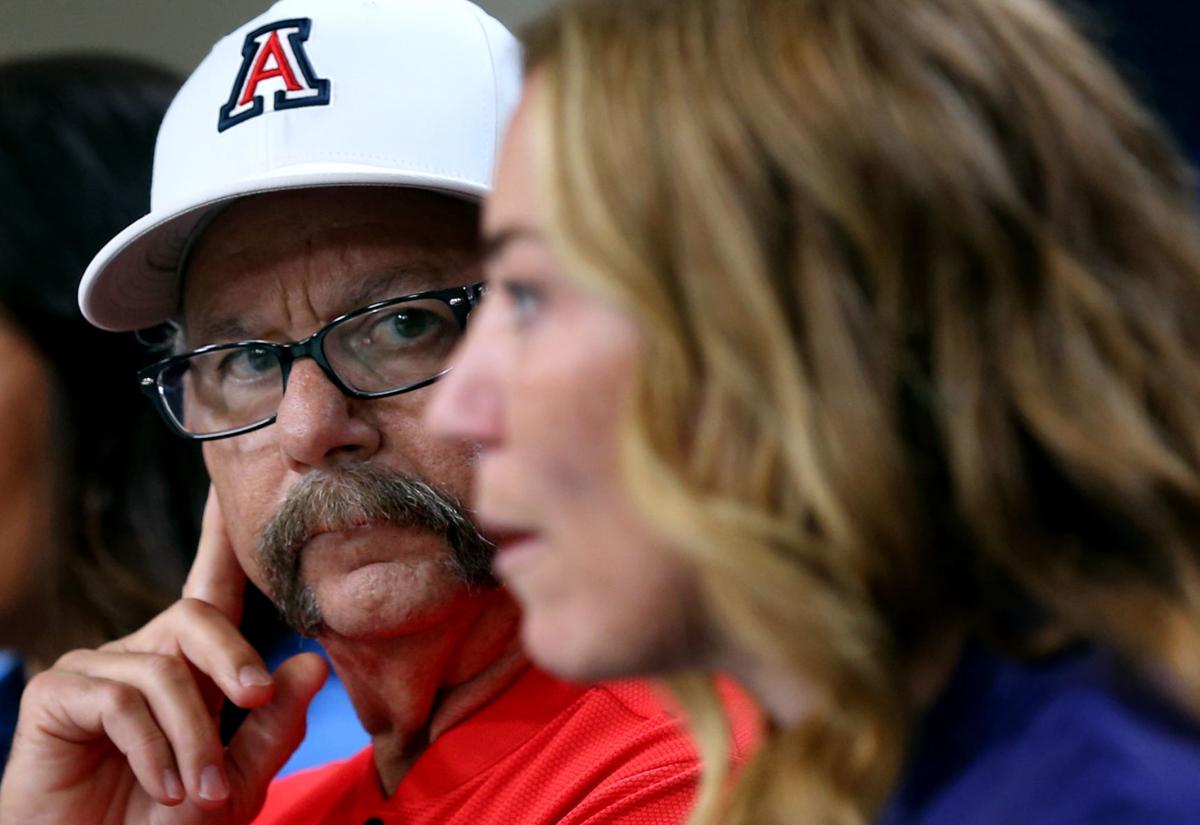OKLAHOMA CITY — In March, Notre Dame women’s basketball coach Muffet McGraw made headlines when she said there weren’t enough female coaches in female sports.
“I think probably 100 percent of the Division I men’s basketball coaches are men,” she said, “and I think that close to 100 percent of the women’s basketball coaches should be women.”
The four coaches in Arizona’s portion of the Women’s College World Series bracket — including UCLA, Minnesota and Washington — talked Wednesday about what, if anything, needs to be done in the sport of softball.
Here’s what each of the four coaches said:
Kelly Inouye-Perez, UCLA:
“You know, to answer the question, my personal opinion, I just think having the best coach for the job is always the most important. I always encourage our own student-athletes, being able to be a Division I coach is a real job now — even the opportunity to be the real breadwinner in the family. I think it’s a great opportunity for those that have played the sport to continue to give back. They’re in great programs, learning a lot. I think they’re not only softball experiences but their life experiences can help develop these young females to be the best they can be.
“I also played for a male coach growing up. Good coaches are good coaches. They’re focusing on the people, the development. There’s so much information I believe in the game now, everybody knows how to play the sport. It’s how you manage your people, how you grow your individuals through these hard lessons on these big stages that I think great coaches leave their mark.
“Yes ... I encourage our own student-athletes to give back to the sport. I celebrate that. It is a real opportunity for them now to do it. There’s a lot of support, budgets, salaries for them to be able to pursue it. I hope we continue to see the sport grow and the female coaching generation continue to grow.
“Once again, I’m looking for the best coaches that can represent at this highest level. It’s not just about the sport. It’s not about your knowledge. It’s about how you grow your individuals, in my opinion.”
Jamie Trachsel, Minnesota:
“I’m going to echo what Kelly said. It’s the right person for the job. I also believe in having a well-balanced staff. With the way that society is, I think having good men around to be good examples to treat these young women with respect, how they should be talked to, cared for, with good boundaries and stuff to show them, like, to be around good people, how they should be treated is important, too.
“Just challenging your kids to be the best versions of themselves, they want to be great on and off the field, in everything they do. Everything is a representation of their character. When they leave your program, they are confident, capable to go out to the next phase of their life, to make their own choices so they can own their own happiness.
“Some people see that in women, some people see that a little bit through men. I think regardless of who the head coach is, maybe having a good balance in your staff, so there’s always someone your players can identify with and feel comfort with as they grow through their collegiate experience.
Mike Candrea, Arizona:
“The one thing I’ve seen in the sport is that we’ve grown a lot more good female coaches. I think when I got into the game early on, that maybe had not been the case. Most of us came from baseball. It was pretty natural.
“I think in today’s world, I mean, I’ve been around enough to see these young ladies grow. I think we have some very capable females that are really good coaches, that understand how to manage people. I’m happy for that. I’m also a believer that if you’re looking for someone, you want the very best fit for your program. To me, it’s the person that’s going to be able to develop these young ladies for life after softball.
“One thing about our sport right now, I wish we had more opportunities for them to play professionally and actually make a living. Until that happens, I think my major job is to get them ready for life after softball. If I can be a good mentor and a good role model for them, whether you’re female or male, I think that’s what’s important.”
Heather Tarr, Washington:
“I maybe have a little bit of a different way of thinking about it. I think the thing that I hope for, maybe 25 years from now, is that our sport continues to gain the respect and a genderless respect with respect to bat and ball. I would just predict in 25 years, you’re going to want some of the Major League Baseball infielders to play like some of our infielders, some of that game to be able to aspire to be like our game.
“There are men in our sport. I think it’s really good for cultures to have both genders maturing young women. I would say, ‘Why not women coaching men?’ That’s I guess where I would like to take the conversation, not try to eliminate men from women’s sports. I would say, ‘Why don’t we be more inclusive and respectful about what women can add to men’s situations?’
“Another thing, too, Coach Candrea can probably speak to this, I don’t know if a lot of men in this game would want to go back to coaching men.”





